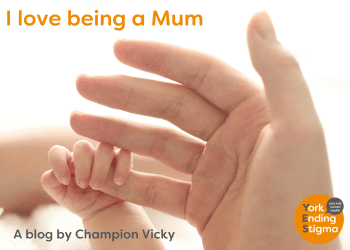
I love being a mum.
But this was not an instant thing.
Society and the media make it seem like it is an instant thing from the moment a baby is born. For me, it was an emotional time, but I did not get that overwhelming “rush of love” that many people talk about. It made me feel like something was wrong with me, like I was a failure already. Why didn’t I love my baby instantly? Why didn’t I want my baby? These thoughts continued throughout my baby’s early days and weeks. I wanted to escape, I wanted to give my baby back to the hospital so the midwives could look after her. I hated my “new” life.
Family and friends would visit us to see my baby. I could not feel the joy that they felt when they saw/held my baby. I was numb. I felt so lonely and isolated.
When I looked in the mirror, I did not recognise myself anymore. I was disgusted with myself. I started to have intrusive thoughts about throwing my baby down the stairs, dropping heavy objects deliberately on my baby’s head, drowning my baby in the bath and when she screamed in the car, getting her out and leaving her at the roadside. I was not inclined to act on these thoughts, they would just randomly pop into my head and make me feel frightened to walk down the stairs with my baby or bath my baby alone. It was difficult for my husband to understand this, and he often looked at me with disgust that I could have those thoughts. But I was not in control of these thoughts, I did not choose to have them. I was diagnosed with Obsessive Compulsive Disorder (OCD) as well as postnatal depression and anxiety.
It was a shock to me when I was diagnosed with OCD. I thought OCD was about rituals where someone might wash their hands a lot, touch things in a particular order or arranging things in a certain way (i.e. external signs of compulsions). I did not realise that having repetitive intrusive thoughts was also OCD.
A change in my anti-depressants and therapy with the local Perinatal Mental Health Team helped these thoughts to reduce over time. I still get them to this day, but the therapy has helped me to realise that they are only thoughts, not facts. I acknowledge that the thought is there, sit with the feeling, and then try to get on with my day (which takes time and practice).
It was not until my baby was 13 months old that I started to feel love and a bond with my baby. When I returned to work after 9 months maternity leave, people would say “Don’t you feel guilty leaving your baby at nursery?” and “It must be so hard leaving your baby”, and I thought to myself actually no, I don’t feel guilty at all. But then I started to feel guilty for not feeling guilty and questioned whether I was a good mother. But I knew I had made the right decision for me to return to work and it has massively benefitted my relationship with my baby, having that time away from her as it makes me appreciate the time I do spend with her a lot more.
I feel a sense of loss and I am grieving for the time from when my baby was born to when I started to feel love for her. I was physically there during that time, but not mentally. I had to put myself first, which is contrary to popular belief that “baby always comes first”. I will not feel guilty for that because if I would not have put myself first and got the help I needed, I would not be here today.
Resources for England
York Ending Stigma
To find out more about our work and to join us to end mental health stigma in York, please refer to our website https://yorkcvs.org.uk/york-ending-stigma/ or email us on yes@yorkCVS.org.uk
